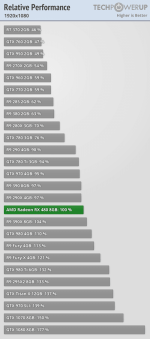Associate
So why is it winning awards from all the reviews I ve looked at
Please remember that any mention of competitors, hinting at competitors or offering to provide details of competitors will result in an account suspension. The full rules can be found under the 'Terms and Rules' link in the bottom right corner of your screen. Just don't mention competitors in any way, shape or form and you'll be OK.
Surprisingly he seemed to like it, competing with an SSC 970.
Where things get tricky here however is the memory speeds. Officially, 7Gbps GDDR5 is the minimum speed for both RX 480 capacities, and this is the speed that AMD’s 4GB reference card runs at. However for their 8GB reference card, AMD has opted to ship the card with faster 8Gbps memory in order to further boost performance. I suspect that AMD would have liked to have used 8Gbps memory throughout, but the aforementioned price target required AMD to make some concessions to comfortable reach it. Otherwise for the higher priced 8GB card, AMD didn’t need to pinch pennies, and as a result they were able to ship it with 8Gbps memory.
The end result is that we have an odd schism between AMD’s card requirements and what they actually ship. The reference 4GB RX 480 meets the RX 480 minimum specifications, whereas the reference 8GB card is de facto overclocked relative to those same specifications. As we’ll see in our benchmark results, the difference in performance isn’t too great, but I don’t think this is an ideal outcome for consumers. My biggest concern right now is what happens when AMD’s partners start shipping their custom cards; if they opt for slower memory buses, then this would mean that custom 8GB cards could end up slightly underperforming the official reference card. But we’ll have to see how that plays out.
So why is it winning awards from all the reviews I ve looked at
At its heart, Polaris is based on AMD’s 4th generation Graphics Core Next architecture (GCN 4). GCN 4 is not significantly different than GCN 1.2 (Tonga/Fiji), and in fact GCN 4’s ISA is identical to that of GCN 1.2’s. So everything we see here today comes not from broad, architectural changes, but from low-level microarchitectural changes that improve how instructions execute under the hood.
Overall AMD is claiming that GCN 4 (via RX 480) offers a 15% improvement in shader efficiency over GCN 1.1 (R9 290). This comes from two changes; instruction prefetching and a larger instruction buffer.
How bizzare
http://www.anandtech.com/show/10446/the-amd-radeon-rx-480-preview/3
So much for a whole new architecture. This starts to explain the performance gap between expectations and reality.
So why is it winning awards from all the reviews I ve looked at
yeh seems to be getting a lot higher praise than I would give it.
In absolute terms it is a perfectly fine card - slightly better performance per dollar than the 970. It is only looking particular bad when you consider it is pretty similar to the 970 for only a little less money but 2 years later, the power efficiency is now equivalent to Maxwell on 28nm, Pascal has 80% better efficiency, and the imminent 1060 may well be faster and use half the power.
Given then choice between a 970 and 480GBP at current rices, if I totally set aside my desired for Linux, openGL and CUDA then I could swing a 480 (if I never wanted to overclock). But compared to what nvidia is going to be offering this is pretty dire. A 2dn hand 970 offers better value for money, price per FPs is in pascal's favor funny enough.
I think we're just seeing a similar slow-down for GPUs like we have with CPUs. Expect GPUs to keep delivering good enough performance for longer, especially at 1080p, which btw doesn't seem to be going anywhere. In a way, that's positive, in another, it's a bit of a let down, sure, but ultimately I think there's way more that can be done on the software side which we haven't seen so far than on hardware.
You have zero warranty with a secondhand GTX970 though and by extension you could argue then to buy a secondhand R9 290 which is better value.
Funny how they also ignore the R9 390 too.

So why is it winning awards from all the reviews I ve looked at
Funny how you ignore reality after getting slapped in the face with it.

What Jay2Cents likes it??
Can't see anyone really buying one of these over even a 970 unless they were skint. Shame I was expecting a little more considering all the hype.

